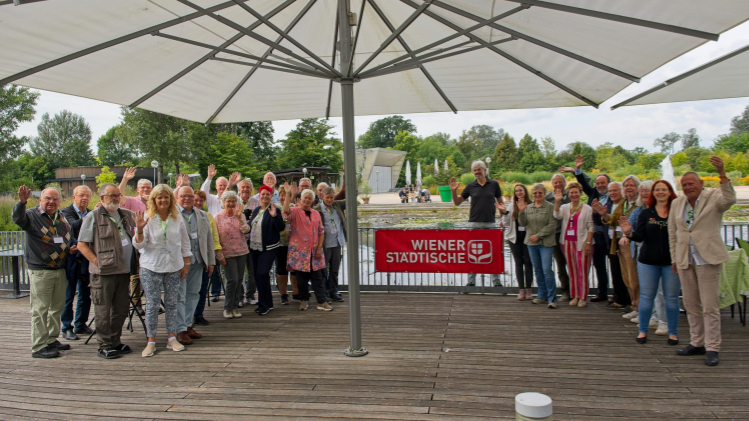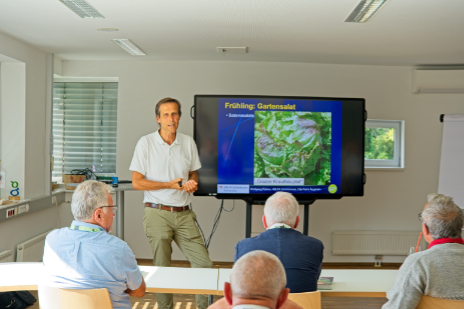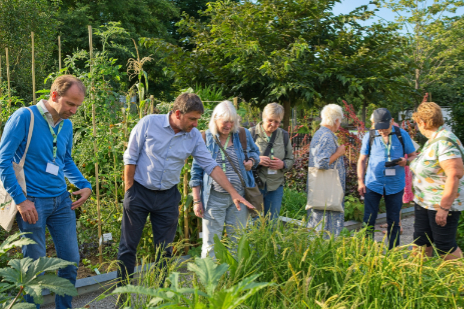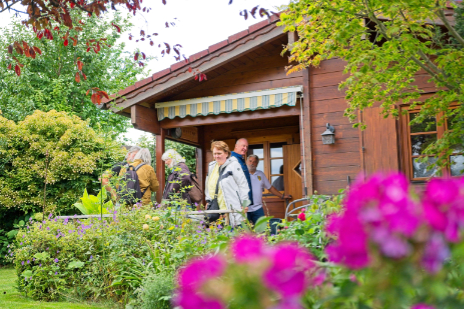

 Dear allotment garden family!
Dear allotment garden family!
As I write these lines, I am filled with a feeling of gratitude and pride - gratitude for what we have achieved together as an international allotment garden family over the past year and pride in the strength that lies within our community.
The year 2025 was characterised by challenges, but also by beautiful moments that have shown how valuable our commitment to the allotment garden movement is.
When I look back on the past few months, I see one thing above all: the diversity and vibrancy of our gardens are reflected in the diversity and vibrancy of our community. We have celebrated anniversaries, initiated new projects and deepened existing friendships. In particular, the celebration of the 100th anniversary of the Swiss allotment garden federation impressively demonstrated how deeply rooted the allotment garden movement is in our towns and hearts. It fills me with joy that we were able to celebrate this event together and experience how much we are united by a common goal: The preservation and further development of our green oases in the midst of a constantly changing world.
Because our allotment gardens are far more than just places to grow fruit and vegetables. They are refuges for animals and plants, green lungs of the cities, places for recreation and encounters. At a time when climate change, urbanisation and social change are presenting us with new challenges, our gardens make an invaluable contribution to the environment, climate and quality of life.
What makes our movement so special is the way we live together. Our associations bring together people from a wide range of backgrounds, age groups and life stories. Experiences are exchanged at the garden fence, tips are passed on, harvests are shared and we celebrate together. Especially at a time when many people are longing for a sense of belonging and genuine neighbourliness, our allotment gardens offer a place where community is not just a word, but a living reality. The solidarity that can be felt on our sites gives strength and confidence - and it is a model for social coexistence far beyond the garden gates.
Our allotment gardens are places where sustainability is practised on a daily basis. We pay attention to the careful use of resources, promote biodiversity through near-natural planting and do not use pesticides. Many of us create compost heaps, collect rainwater, cultivate old fruit varieties and create habitats for insects and birds. Scientific studies show that allotment gardens are hotspots of biodiversity. Every flower strip, every orchard, every herb bed in our gardens is a contribution to the preservation of biodiversity. In many cities, allotment gardens are often the last refuges for endangered species. They are living examples of how sustainable cultivation and love of nature can go hand in hand.
The health value of our gardens should not be underestimated either. Exercising in the fresh air, experiencing nature and doing things together promote not only physical but also mental health. Studies show that regular gardening reduces stress, increases well-being and can even reduce the risk of cardiovascular disease. Especially in our fast-paced world, our gardens offer a balance that is good for body and soul. We know how beneficial it is to relax in green spaces after a busy day.
Another central theme this year was the passing on of knowledge and traditions. We have been cultivating our gardens for over 100 years and have gathered a wealth of experience in the process. We pass on this knowledge of growing, harvesting and preserving food to our children and grandchildren - a value that is priceless, especially in times of crisis. This year's study session in Tulln focussed intensively on the topic of "Being prepared for crises" and showed how important our gardens are for the security of supply and the resilience of our society.
We were also able to intensify our joint work at two meetings in 2025. At the General Assembly in Luxembourg and the study session in Tulln, the enthusiasm with which everyone is working to further develop our ideas and goals was once again evident. With a voice representing over two million allotment garden families, we have the opportunity to make ourselves heard by political decision-makers at national and European level - an opportunity that we must utilise even more in the future.
I would like to take this opportunity to thank all those who put their heart and soul into our movement - be it in their own garden, in their association, at national or international level. It is you who keep our community alive, who contribute new ideas and preserve traditions. Without your commitment, your creativity and your willingness to take on responsibility, none of this would be possible. You are the heart of our movement.
As this year draws to a close, I would like to encourage you all to continue to work with confidence, vigour and joy on the development of our allotment gardens. Let us work together to ensure that our gardens remain places of diversity, sustainability and togetherness in the future. Let us be proud of what we have achieved and courageously take on the challenges that lie ahead. Together, we can achieve a great deal - for our cities, our environment and our society.
I wish you and your loved ones a relaxing festive season and all the best and good health for the new year 2026. May it be a year full of joy, community and shared successes!
With best regards
Sylvia Wohatschek
Secretary General
Fédération Internationale des Jardins Familiaux
World Soil Day is celebrated worldwide on 5th December. This day reminds us how essential healthy soils are to our lives. Soils are more than just ‘earth’ – they are the basis of our food supply, they store water, bind carbon and are home to billions of microorganisms, insects and plants. Without fertile soil, there would be no biodiversity, no agriculture and no effective climate protection.
Why is this important?
• Soil protects the climate: it stores large amounts of CO₂ and thus helps to slow down climate change.
• Soil stores water: healthy soil absorbs rain and prevents flooding.
• Soil is a habitat: a teaspoon of soil contains more living organisms than there are people on Earth!
Allotments as guardians of the soil
Allotments are true sanctuaries for our soil. While more and more land in cities is being sealed, allotments remain green islands that preserve and nurture the soil. They are places where sustainable soil use is put into practice:
• Natural cycles instead of waste: Allotment gardeners compost organic waste and return nutrients to the soil. This creates humus, which improves the soil structure and maintains fertility.
• Diversity instead of monoculture: Allotments are colourful – vegetable beds, fruit trees, flowers and shrubs alternate. This diversity promotes active soil life and protects against soil erosion.
• No chemicals: Many allotment gardeners rely on organic methods and do not use pesticides or artificial fertilisers. This protects not only the soil, but also the groundwater and biodiversity.
• Habitat for soil organisms: Earthworms, microorganisms and fungi find ideal conditions in gardens that are cultivated in a natural way. They loosen the soil, improve water absorption and ensure a stable ecosystem.
• Climate protection on a small scale: Healthy soil in allotments stores carbon and thus contributes to the reduction of greenhouse gases. Every square metre counts!
Allotments are therefore not only places of relaxation, but also important partners in the fight against climate change and species loss. They show how soil protection works in everyday life – right on our doorstep.
What can we do?
• Create compost and maintain it properly
• Do not dig the soil unnecessarily in order to preserve soil life
• Mulch to retain moisture and prevent erosion
• Avoid chemical fertilisers and pesticides
World Soil Day is an invitation to appreciate the soil – because it is the basis of all life. Every allotment is a piece of the future: for us, for nature and for the climate.
https://www.fao.org/world-soil-day/en/
 Allotments as pioneers of sustainability
Allotments as pioneers of sustainability
The European Week for Waste Reduction is an initiative that takes place every year in November and raises awareness of the responsible use of resources. The aim is to prevent waste before it is created – through smart everyday decisions, sustainable consumption habits and creative solutions.
Allotments play a key role in this. They are not only places of relaxation but also centres for environmentally conscious action. Here, the circular economy is put into practice:
• Composting instead of waste – garden waste is turned into valuable humus that nourishes the soil and replaces chemical fertilisers.
• Home-grown produce instead of packaging waste – fruit and vegetables from your own garden reduce plastic packaging and transport distances.
• Upcycling and reuse – old materials are turned into new beds, climbing aids or decorative elements.
In addition, allotment gardens promote biodiversity and contribute to climate protection: every square metre of green space binds CO₂, provides habitat for insects and supports local biodiversity.
European Waste Reduction Week invites all allotment gardeners to showcase their ideas:
• Compost workshops
• Plant and seed exchanges
• Campaigns to reduce plastic in the garden
This is how a small garden can make a big contribution to a sustainable future.
 Attached you will find the resolution adopted by the NGOs participating in the Committee on Environmental and Health Crises of the Conference of INGOs of the Council of Europe as a contribution to the summit currently taking place in Belém (Brazil).
Attached you will find the resolution adopted by the NGOs participating in the Committee on Environmental and Health Crises of the Conference of INGOs of the Council of Europe as a contribution to the summit currently taking place in Belém (Brazil).
The summit addresses challenges that are difficult to solve without joint commitment.

From 21 to 24 August 2025, the study conference of the Fédération Internationale des Jardins Familiaux took place in Tulln an der Donau. Representatives from ten European nations met for an exchange at the seminar centre of the Landesgartenschau "Die Garten Tulln" (Tulln Garden Show).
The theme of this year's study conference, organised by the Austrian association, was: "We are prepared – How we allotment gardeners can respond to today's crises."
Allotment gardeners are an important building block when it comes to climate protection (biodiversity, cooling cities, etc.). They have a broad knowledge of how sustainability not only protects the environment and resources, but also how they can be self-sufficient. All these skills are valuable when it comes to responding to today's crises.
The aim of the study conference was to exchange experiences with international organisations in order to learn from their findings and implement exemplary projects in their own countries.
In addition to intensive exchanges between participants, lectures by specialists from various organisations were also offered in German and English.
Of course, the supporting programme included a special guided tour of "Die Garten Tulln" with its 70 model gardens, so that participants could gain not only theoretical but also practical experience.
An invitation to the Krems an der Donau allotment garden association was also on the programme. During this visit, at which the international allotment garden family received an exceptionally warm welcome, several Austrian associations were delighted to receive international certificates of honour.
Thursday, 21 August – Arrival day
The guests were accommodated in a hotel located 15 minutes' walk from the venue. First, the Fédération Internationale held a board meeting and general assembly in the hotel's conference room. This was followed by a leisurely walk through the picturesque Au to a barbecue evening at the Gaumenweide restaurant in the "Garten Tulln".
Friday, 22 August – Study conference day 1
 The study conference opened at 9 a.m. on Friday. The participants were warmly welcomed by the host of Garten Tulln, Managing Director Franz Gruber, MSc. (www.diegartentulln.at)
The study conference opened at 9 a.m. on Friday. The participants were warmly welcomed by the host of Garten Tulln, Managing Director Franz Gruber, MSc. (www.diegartentulln.at)
The first items on the agenda began immediately afterwards. During the "speed date," the nations exchanged views on the challenges and measures in their associations.
Furthermore, the head of the seed archive at "Arche Noah", Mag.a Michaela Arndorfer, presented her lecture "Plant Kingdom in a Small Area". (www.arche-noah.at)
After lunch together, the series of presentations, held in both German and English, continued.
The director of CITY FARM Vienna, Dipl. Ing. Wolfgang Palme, impressed with his presentation "4-Season Gardening" on the possibilities of year-round garden use. (www.cityfarm.wien)
 Florian Binder, biodiversity officer at the Austrian Central Association, gave the audience an understanding of the "climate-friendly garden" through implementation ideas.
Florian Binder, biodiversity officer at the Austrian Central Association, gave the audience an understanding of the "climate-friendly garden" through implementation ideas.
The final item on the agenda was a guided tour of "Die Garten Tulln". In Europe's first exclusively ecologically maintained and designed garden show, interested visitors can find practical suggestions, ideas and inspiration for designing their own gardens in the 70 model gardens.
A successful first day of the study conference ended with a joint dinner at the Gaumenweide restaurant. (www.gaumenweide.at)
Saturday, 23 August – Study conference day 2
The second day began at 9 a.m. with further presentations and subsequent discussions among the international guests.
Ms Margit Benes-Oeller from the Lower Austrian state association "Natur im Garten" gave a very informative presentation on "water management" in the garden. (www.naturimgarten.at)
Guido Beneke, managing director of the Lower Saxony Association of Gardeners, focused his presentation on allotment gardens as a meeting place for different generations, as well as the resulting challenges and solutions. (www.deutsche-schreberjugend.de)
After lunch together, Marius Monen from Avans University of Applied Sciences concluded the series of presentations with his analysis of "How allotment gardeners can contribute to innovative solutions for resilient urban green spaces."
 Next on the agenda was a visit to the "Krems an der Donau" allotment garden site (www.kgv-krems.at). The international guests were warmly welcomed and invited to take a tour of the site. They were divided into two groups and were able to explore the gardens. This resulted in numerous personal conversations and insights into the lovingly designed plots.
Next on the agenda was a visit to the "Krems an der Donau" allotment garden site (www.kgv-krems.at). The international guests were warmly welcomed and invited to take a tour of the site. They were divided into two groups and were able to explore the gardens. This resulted in numerous personal conversations and insights into the lovingly designed plots.
The convivial setting at the clubhouse was also used to present the Fédération Internationale des Jardins Familiaux's certificates of honour to deserving clubs.
From Linz, the "Eisenbahner Kleingartenverein" association received the certificate of honour for nature-friendly gardening and the "Auwiesen I" association for social activities. Both honours were accepted by the president of the Upper Austrian Allotment Gardeners' Association, Josef Reisinger.
The "Groß Jedlersdorf" association was delighted to receive the international award for innovative projects. The award was presented directly to Ernest Kern, chairman of the association from Vienna Floridsdorf.
Last but not least, the ladies of the "Frauenfachgruppe Floridsdorf" (Floridsdorf Women's Group) were also awarded a certificate of honour for social activities. For many years, their commitment to good causes has made them an important part of the allotment garden family. The award was accepted by the visibly moved new chairwoman of the women's group, Gerda Grach.
On the way back from Krems to Tulln, the conference guests stopped at a typical wine tavern and were able to enjoy a cosy end to their last evening. (www.weinschenke-korntheuer.at)
Sunday, 24 August – Departure day
After breakfast and a general meeting at the hotel, it was time to say goodbye to Tulln. The visibly satisfied participants took many impressions and experiences back to their national associations with them to strengthen the international allotment garden family.